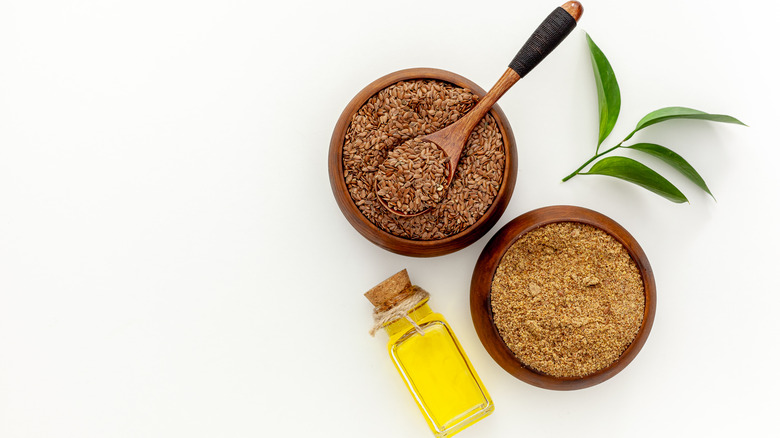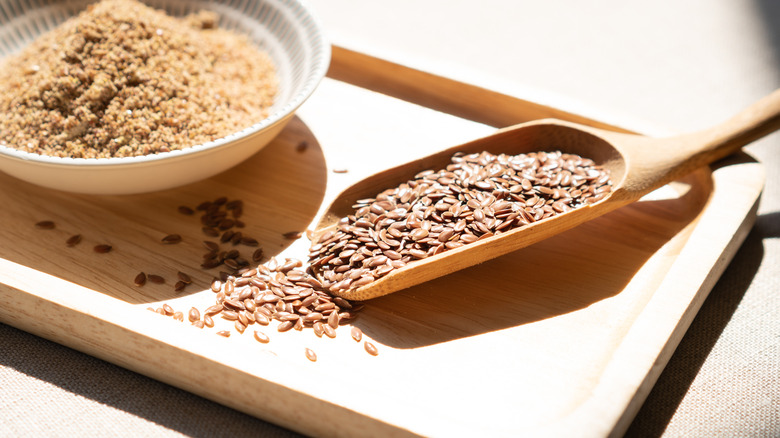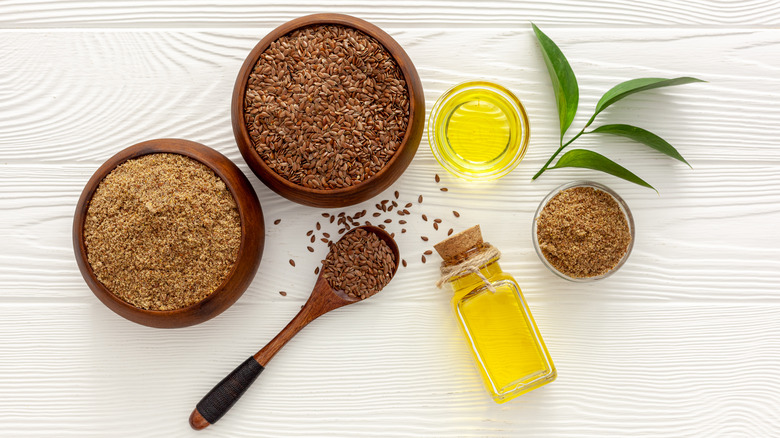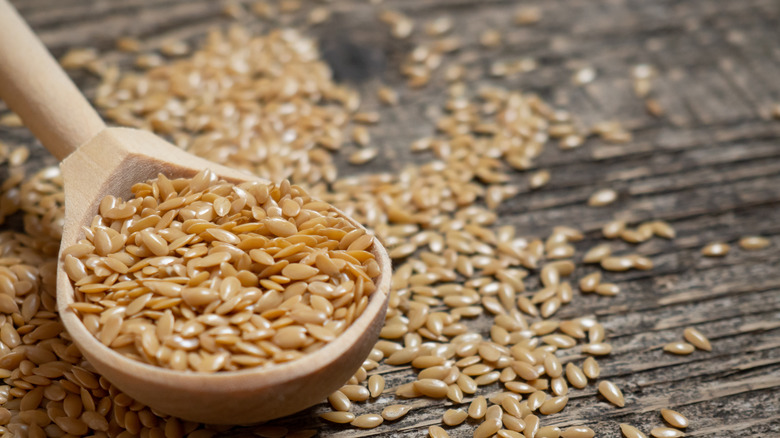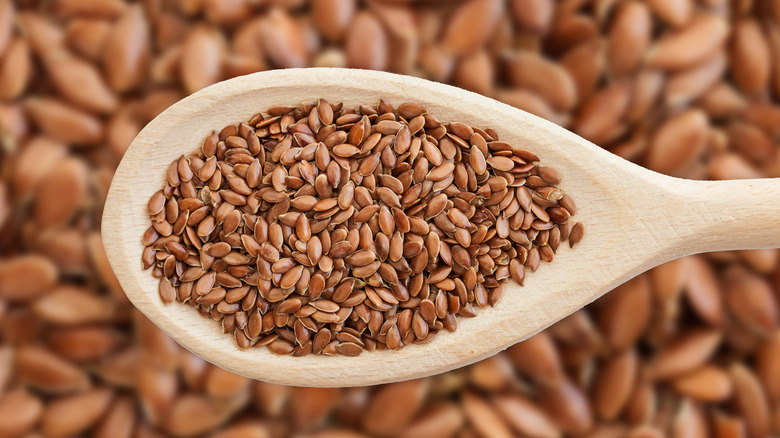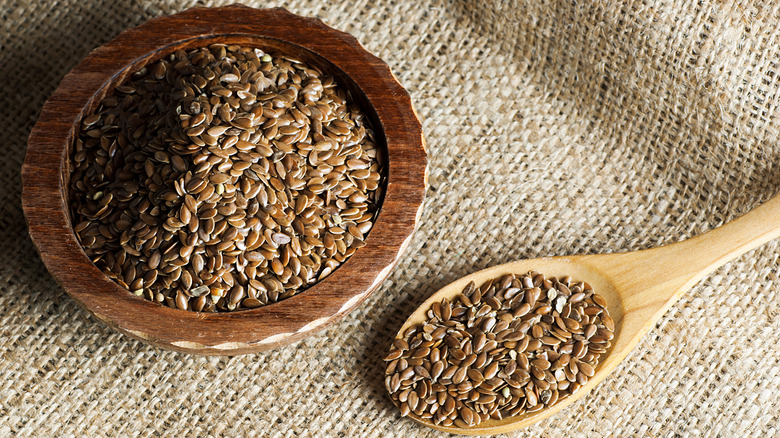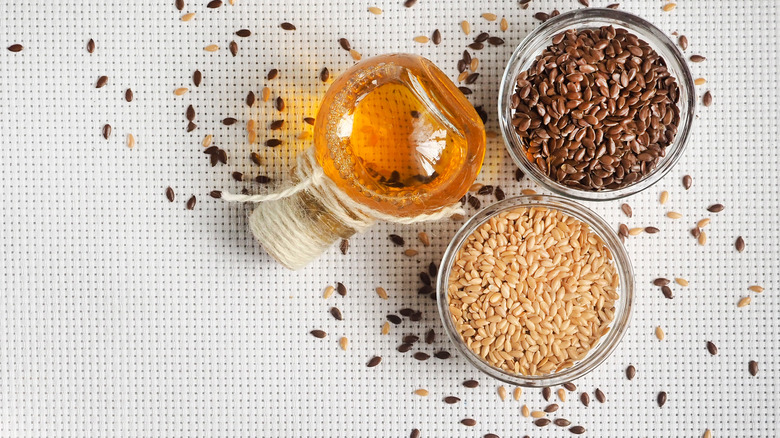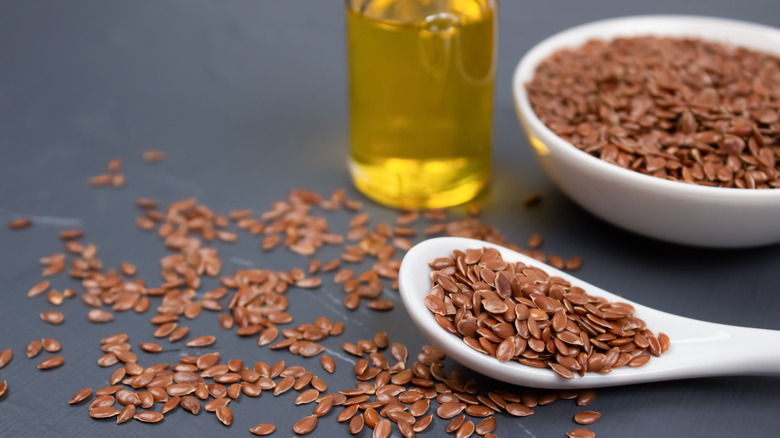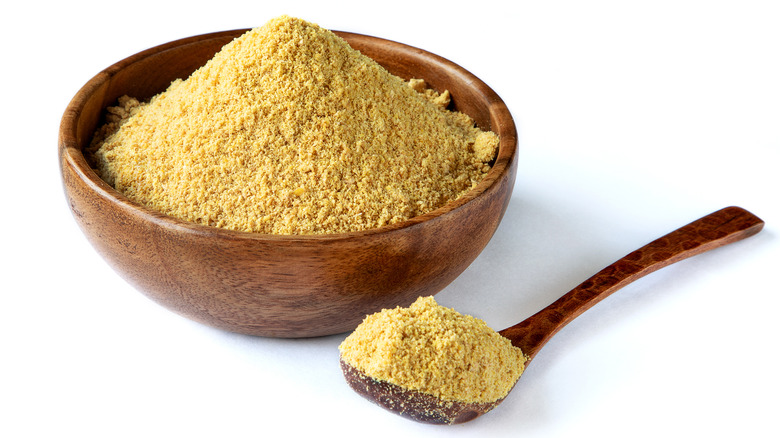What Are Flaxseeds And How Do You Use Them?
Flaxseeds have become a buzz word in the health and wellness community, but what exactly are they and are they really that good for you? As the name might imply, they come from flax, which is an ancient Egyptian and Chinese crop that was — and is — still currently considered a functional food, aka one that can be ingested for possible health benefits, according to Medical News Today. Flaxseeds are completely sourced from the flowering flax plant, making them even beneficial for vegans and vegetarians to consume.
According to Healthline, flaxseeds contain high quantities of fiber, protein, and omega-3 fatty acids — all in one spoonful. The latter of these three, omegas, are commonly sourced in seafood, which vegans and some vegetarians don't consume, again making flax a great animal-free replacement for these needed nutrients.
Nonetheless, the seeds can be enjoyed by meat lovers and plant-based folks alike, as they contain other valuable nutrients like healthy fats, fiber, and antioxidants, according to Medical News Today.
There's much to learn about this superfood that has taken the health world by storm. Before you run off to your nearest Whole Foods to buy in bulk, here are some other facts about flaxseeds and how best to use them.
What are flaxseeds?
As touched on before, flaxseeds are derived from a plant called flax — they essentially are just the seeds that are harvested from flax pods. It's a crop that is even mentioned in the Bible, according to The Thread Blog. In those ancient times, not only was flax used in foods, but it was also present in many of the clothes people made and wore.
Flax is said to have first originated in Egypt to be exact, according to Golden Valley Flax. And even in those historic times, people knew the benefits of consuming it. In ancient Roman and Greek history, the plant was used medicinally to relieve pain and constipation (via St. Luke's Hospital). Furthermore, WebMD states that, in ancient Babylon, King Charlemagne forced his subjects to consume flaxseeds, as he associated many health benefits with the grain, becoming a trendsetter before the health world as we know it today caught on to these benefits.
How are flaxseeds made?
Flaxseeds are pretty much in their finished form when they're harvested from flax pods, which happens during the end of August or early September, according to Flax Farm. They get their brown color after the pods swell from blossoming, though the exact shade might differ between regions, says culinary scientist Jessica Gavin. After this point, they're pretty much ready to be consumed.
According to the Agricultural Marketing Resource Center, flax is best grown in cool climates with exposure to lots of daylight. Therefore, as they note, Canada has become the largest producer of flaxseeds — but let's not forget flax's ancient Egyptian roots. During those times, flax was harvested when it grew to about hip height (via University College London). From there, it's assumed that every individual stalk was soaked in water in order to break down the cells that made up the plant in order to extract the seeds.
Similarly, modern flaxseeds are removed from more pliable pieces of stalk after a three- to five-week period of hanging and drying, according to Gardening Know How. After this process, the seeds can be extracted through the means of applying a heavy force to the pods, which can range from using a rolling pin to even a car, says the article.
Flaxseeds vs flaxmeal
There is often some confusion between flaxseeds and flaxmeal, but the truth is, they're not very different at all.
Both originate from the flax plant, and the main difference is just in their form. According to Livestrong, flaxmeal is just flaxseeds that are ground up, making them easier to digest for some sensitive stomachs. However, if you purchase ground flaxseeds instead of the whole variety, this isn't an issue.
Flaxmeal comes in more of a powdered form, so it's ideal for when you want to add a scoop to smoothies and other drinks. Rather than getting a mouthful of flaxseeds as you're sipping your coffee, it's better to add just a small spoonful of flaxmeal, so it can properly dissolve and combine with the rest of the liquid and not change the taste or texture.
In addition, another thing to note as you're heading to the store is that flaxseeds are also often referred to as "linseeds," according to DifferenceBetween.net. So don't overthink the wording, because this superfood has many names and forms — all with the same great benefits!
What do flaxseeds taste like?
Flaxseeds have a very subtle nutty flavor, which makes them great for both sweet and savory dishes, according to Everyday Health. This can range too — add some flaxseeds to pastries for an extra health boost or top on salads for some extra crunch.
By comparison, chia seeds, another superfood that flaxseeds are often grouped with, are noted to have a taste that is more bland than flaxseeds, according to Healthline. So, if you want that extra subtle taste added to your baked goods, opt for flaxseeds over chia seeds.
However, WebMD says that even the pickiest of eaters wouldn't notice if a few flaxseeds were sprinkled into their meal. Which is great news if you have any youngsters who might have an aversion to vegetables, as flaxseeds are an excellent source of fiber, says Medical News Today, that you can easily sneak into kids' meals.
How to cook with flaxseeds
Flaxseeds are best incorporated into smoothies, oatmeal, and cereals, where they can be sprinkled in without infringing too much on the taste, according to Be Still Farms. Because they're often marketed as a superfood, many manufacturers have capitalized on the appeal of flaxseeds too and have added them to many granola bars and crackers, according to WebMD. And really, these seeds are great boost of fiber to any food item, because of their subtle taste and consistency.
Another popular way to use flaxseeds when cooking, especially for those in the plant-based community, is to use them as a substitution for eggs, according to Taste of Home. Simply mix one tablespoon of ground flaxseed with three tablespoons of water, and you will have an ingredient that mimics the consistency of an egg, which is perfect for baking or even as a binding agent for a veggie burger.
For any caffeine fiends out there, you can even add flaxseeds to your coffee. The Old Coffee Pot recommends grinding the seeds first before using them as an addition to any coffee or smoothie so that the ground meal can easily dissolve in the liquid. The best way to go about this is to crush the seeds so that they have a paste-like consistency.
Where to buy flaxseeds
Despite having the "superfood" label, flaxseeds are not exclusive to those living in big cities or near health and wellness meccas where there's easy access to specialty stores. You can purchase them online through vendors such as Amazon, too. However, if you do live near a vitamin store, you can usually find flaxseeds there, as well as health-focused supermarkets like Whole Foods.
If you have a green thumb, you can even grow your own! You can purchase starter seeds from health markets or gardening stores. Flaxseeds grow well in pots, so they are ideal for city folks, too, according to Balcony Garden Web. Though, American Meadows recommends growing the plant in the early spring, when the flax plant will have exposure to plenty of sunlight and dry soil. If you live in temperate climates, you can start growing the plant in the later months of the year. After six to eight weeks, the seeds should be ready to be harvested. By planting your own flaxseeds, you'll have the flexibility and accessibility to this powerful ingredient whenever you want!
Nutritional information for flaxseeds
As mentioned previously, flaxseeds are a known superfood, but what exactly does this mean? A basic definition of the buzz word is any food that can be deemed nutrient-rich, sometimes plant-based, and always has powerful health properties.
Flaxseeds are extremely nutrient-rich, containing omega-3s, fiber, and protein, and with little calories, according to Health.com. In addition, they are especially beneficial for the heart, and have been found to possibly reduce blood pressure, decrease the risk of a stroke, and lower cholesterol, according to the article.
Flaxseeds are also gluten-free, and are great for making pastas, baked goods, and artisan bread without any risk, according to Gluten-Free Living. The non-GMO and organic baking company, Food for Life, also states that it uses flaxseeds to make many of its sprouted grain products, which include cereals, waffles, and breads. However, flaxseeds are not actually considered to be a grain by the Food and Drug Administration (FDA), according to the Whole Grains Council.
Other varieties of flaxseeds
In addition to the common brown flaxseeds we are accustomed to seeing or eating, there are also golden flaxseeds. More than just color, this type differs from the more common variety in terms of their geographic origins and nutritional makeup.
Brown flaxseeds are native to northern regions of the United States. However, as discussed, brown flaxseeds have been around for centuries and were originally grown in the Eastern Hemisphere before making their way over to the Americas. Golden flaxseeds, on the other hand, were actually recently developed as a hybrid by South Dakota and North Carolina State Universities in order to maximize the benefits of lignans (healthful polyphenols in plant products) and omega-3s. So their pretty color was actually just a byproduct of this goal, adds Golden Flax 4 U. Golden flaxseeds also have slightly more polyunsaturated fatty acids and less monounsaturated fatty acids than common brown flaxseeds, according to Livestrong.
You can purchase golden flaxseeds from many of the same retailers as brown flaxseeds, such as Bob's Red Mill Natural Foods. And now that you have more awareness for all flaxseeds can do, we're sure you'll want to stock up!
